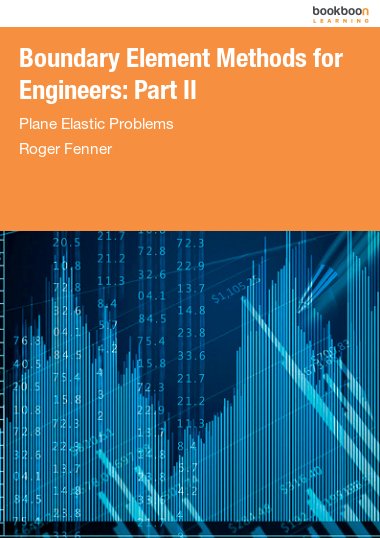The book offers a deliberately simple introduction to boundary element methods applicable to a wide range of engineering problems. The mathematics are kept as simple as reasonably possible. Several boundary element computer programs, written in both Fortran and Matlab, suitable for use on desktops or laptops are presented and described in detail and their uses are illustrated with the aid of a number of practical examples. Problems, with solutions, are provided at the ends of the chapters, for readers to solve for themselves. The book is presented in two Parts. Part I starts with a brief review of the problems encountered in engineering, showing that they of two broad types. It then describes boundary element treatments of problems of the potential type, using both constant and quadratic boundary elements. Part II is concerned with elastic stress analysis problems of the plane strain and plane stress types.

Description
Content
book.tabs.appendix
- Boundary Element Analysis of Plane Elastic Problems
- Fundamental Solution
- Boundary Integral Equations
- Discretisation of the Boundary Integral Equations
- Boundary Conditions and Surface Stresses
- Quadratic Boundary Elements
- Scaling
- Solving the Linear Equations
- Body Forces
- Quadratic Boundary Element Program for Plane Elastic Problems
- Program BEM2EQ
- Some Test Problems for BEM2EQ
- An Example: Confined Compression of a Rubber Block
- An Example: Stress Concentration at a Hole in a Flat Plate
- Discussion
- Further Applications
- Axi-symmetric Problems
- Higher-Order Boundary Elements
- Three-dimensional Problems
- Non-Linear Problems
- Comparison with Other Methods
- Appendix A: Gaussian Quadrature
- Appendix B: Gaussian Elimination
- Appendix E: Matlab Version of Quadratic Boundary Element Program for Plane Elastic Problems
- Solutions to Problems – Part II
The programming language used in the main text is Fortran. Although it is somewhat unfashionable these days for general programming purposes, Fortran is still very widely used in engineering computation. Matlab versions of the programs are also provided in Appendices. Full listings of all the programs, both Fortran and Matlab, are available for download here.